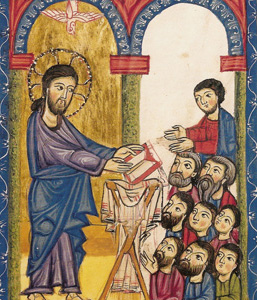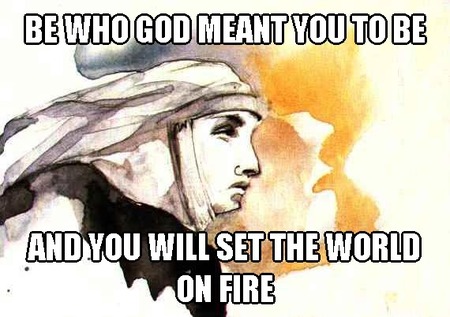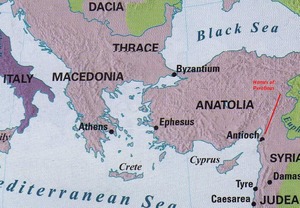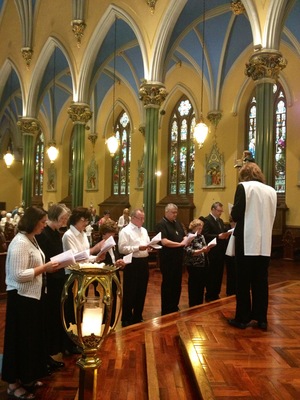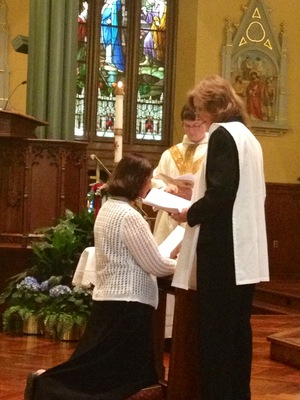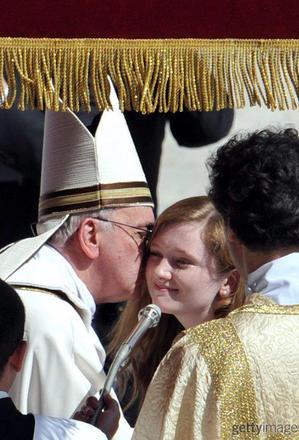How does the priest address the needs of the faithful today? Can the priest answer the questions being asked by the faithful and those seeking to know God,or at least willing to do the work needed to answer these questions? What type of witness needed today by the priest viz. the culture, media, and politics, so that we are happy, healthy and loving Christians? What are the concrete ways can we focus on God? How do Christians face nihilism with faith, hope and charity? What does it mean to be a person –and not merely an individual– realizing that the person is a part of a whole who glorifies God?
Month: April 2013
Saint Pius V, pope
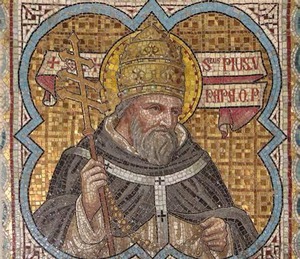 Antonio Ghislieri (1504-72) was born near Alexandria, a town in Lombardy on the Adriatic. His vocation was with the Dominicans who educated him, had him ordained and missioned him to teach theology. He was elected bishop having served in several places where and he sought to reform the moral and theological, canonical and liturgical laxity of the clergy and laity alike; his concern was the coherence of the Catholic Faith. Sound familiar? Among his many responsibilities was taking up the work of Inquisitor in the Italian region. He was elected to the See of Rome in 1566. As Pope he strenuously promoted the Catholic Reformation outlined by the Council Fathers of Trent (doing of the same work as pope as he did as bishop), oversaw the excommunication of Queen Elizabeth I of England, encouraged missionary work and reformed the brieviary,the sacred Liturgy and the Catechism.
Antonio Ghislieri (1504-72) was born near Alexandria, a town in Lombardy on the Adriatic. His vocation was with the Dominicans who educated him, had him ordained and missioned him to teach theology. He was elected bishop having served in several places where and he sought to reform the moral and theological, canonical and liturgical laxity of the clergy and laity alike; his concern was the coherence of the Catholic Faith. Sound familiar? Among his many responsibilities was taking up the work of Inquisitor in the Italian region. He was elected to the See of Rome in 1566. As Pope he strenuously promoted the Catholic Reformation outlined by the Council Fathers of Trent (doing of the same work as pope as he did as bishop), oversaw the excommunication of Queen Elizabeth I of England, encouraged missionary work and reformed the brieviary,the sacred Liturgy and the Catechism.
Saint Pius V, Pope, pray for us.
Saint Catherine of Siena
Set the world on fire by being who are meant to be…
Who else but the glory of Siena than Catherine who is so enkindled with the fire of Christ’s love for humanity to have said, “Be who God meant you to be and you will set the world on fire,” than Saint Catherine of Siena.
Under the patronage of Saint Catherine of Siena we ask her to beseech God for us for: fire prevention, purity, bodily illness, nurses, firefighters, illness, Italy, miscarriages, people ridiculed for their piety, sexual temptation, sick people, sickness, television.
Why Christians need Antioch
These weeks we are hearing the narrative of the very early followers of The Way, that is, those who adhere to the Good News taught by Jesus, the crucified and risen one.
With the killing of the deacon while kidnapping the two bishops in Syria has me concerned about Christians losing the sensitivity to the importance of Syria as a key Christian center. Most Western Christians forget that our Christians origins in the West was first formed in the East. Recall from Acts that “it was in Antioch that the disciples were first called Christians.” It was in Antioch, not in Rome, not in Moscow, not in Constantinople, that the disciples of Jesus of Nazareth were first generated by the Holy Spirit, they were called by name. It’s not West OR East, but West AND East when comes to Christian faith. Does Antioch have any resonance with you Christians? Do you have any concern for our Christian heritage in Syria? What’s our concern for those being killed for being Christian today? Do we even care? Remember: God has created each of us to do Him some definite service; let us live and work in charity for our neighbor.
A famous Antiochian saint, the bishop Ignatius said this in his letter to the Magnesians, “It is right, therefore, that we not just be called Christians, but that we actually be Christians” (4.1).
Too often do I hear that it was much easier to be a Christian of the early years following the Ascension of the Lord and the Pentecost than today. That’s a crazy idea! First of all, no one who knows history can hold that idea as valid. Those who really and truly followed Jesus Christ as Lord and Savior, Messiah and Word made flesh, were harassed and/or killed. The Acts of the Apostles testifies to the fact that Jesus’ followers were killed. There is little difference with state of Christianity in AD 13 than in 2013. So what happened to the Christians in the 1st century is no different than what the dictatorship in Syria is doing now.
So, we can’t allow Syria to further unravel and act contrary to faith and reason. We need to remember that Antioch is crucial to our Christian identity today because our faith in the Lord is no less real, no less beautiful, no less controversial today than in previous eras. It is in Antioch (Syria) that we our Christian identity (belief, liturgy, church tradition, music, science and culture) was formed. Antioch (that is, Syria in general) and the people who live there is the place where and the community where we’ve learned the horizons of our Hope in what Jesus promised.
A preacher whom I like very much is the Very Reverend Denis Robinson, OSB, the president-rector of Saint Meinrad School of Theology. Dom Denis is a Benedictine monk and priest who teaches systematic theology. In 2007, he earned a doctorate in theology specially in the work of Blessed John Henry Newman from the Catholic University of Louvain, Belgium. Recently, he said,
As long as we keep stored up in ourselves the well-rehearsed scripts of indifference, ineptitude, pain, doubt, self-loathing. As long as we think we know the answers, after all that’s what mamma said, until we see that the world is more complicated than the truth we learned at our mother’s knee Brothers and sisters, there is one thing and one thing only that we need. We need Antioch. We need that identity. We need Antioch because we must learn to call ourselves something other than forsaken. We need Antioch. We need to learn to love rather than judge, to give rather than take, to provide for one another rather than constantly seeking the self, the damn self that will be truly damned if we cannot give ourselves over to Christ, all to Christ, fully to Christ, forever to Christ. Where will it be? Where will it be then? If not in Antioch, where will it be? Brothers and sisters we continue to revel in this Easter season knowing I hope full well that the complex completeness of Easter did not come on that solemn night of proclamation. Antioch beckons us in the name of towns and places as yet unseen, unknown, unexplored. And we respond full of hope that the fullness of Easter is still rushing in.
Without perseverance no one can please God, St Catherine of Siena taught
Who we read impacts the way we live. Catherine of Siena, whom the Catholic Church honors today, has much to say to the modern person. In one of her letters we read the following, which ought to bolster our approach in our daily work.
To Sano Di Maco and All Her Other Sons in Siena: In the Name of Jesus Christ crucified and of sweet Mary:
Dearest sons in Christ sweet Jesus: I Catherine, servant and slave of the servants of Jesus Christ, write to you in His precious Blood: with desire to see you strong and persevering till the end of your life. For I consider that without perseverance no one can please God, or receive the crown of reward. He who perseveres is always strong, and fortitude makes him persevere.
Does What I Believe In Affect My Life?
Ultimate questions are critical for all persons. And so much for Christians because of the Incarnation of God in human history. What does it mean to believe? What can science teach us? Is using technology a helpful tool in knowing our Christian self? In a Year of Faith presentation on April 20, the topic at hand was “Does What I Believe In Affect My Life?”
Saint Catherine of Siena
Saint Catherine of Siena writes:
I want your security to be in Christ gentle Jesus. He has clothed us in the sturdiest garment there is, a garment of love….The very first garment we ever had was love, for it was only by love that we were created in God’s image and likeness.
(Letter 185-86)
Third Order Dominicans, New Haven, celebrate rites of reception and profession
“Among the means of holiness most useful and opportune for the defense of and progress of Christian faith and morals in our day, we recognize the Dominican Third Order as one of the most eminent, easy, and secure.”
Last year’s post on these same rites.
The Spirit changes us
At the Sacrifice of the Mass in St Peter’s Square, Pope Francis also celebrated the Rite of Confirmation with 44 people from around the world. As we approach Pentecost, this excerpt from his short homily is very instructive. Pay attention. Don’t forget to daily ask, no beg, for the Holy Spirit to have a special grace to embrace the day. May the Spirit be with these 44 newly confirmed in the Faith, indeed, all those around the world who are receiving the sacrament of Confirmation these days.
This is the work of the Holy Spirit: he brings us the new things of God. He comes to us and makes all things new; he changes us. The Spirit changes us! And Saint John’s vision reminds us that all of us are journeying towards the heavenly Jerusalem, the ultimate newness which awaits us and all reality, the happy day when we will see the Lord’s face – that marvelous face, the most beautiful face of the Lord Jesus – and be with him for ever, in his love.
You see, the new things of God are not like the novelties of this world, all of which are temporary; they come and go, and we keep looking for more. The new things which God gives to our lives are lasting, not only in the future, when we will be with him, but today as well. God is even now making all things new; the Holy Spirit is truly transforming us, and through us he also wants to transform the world in which we live. Let us open the doors to the Spirit, let ourselves be guided by him, and allow God’s constant help to make us new men and women, inspired by the love of God which the Holy Spirit bestows on us! How beautiful it would be if each of you, every evening, could say: Today at school, at home, at work, guided by God, I showed a sign of love towards one of my friends, my parents, an older person!
